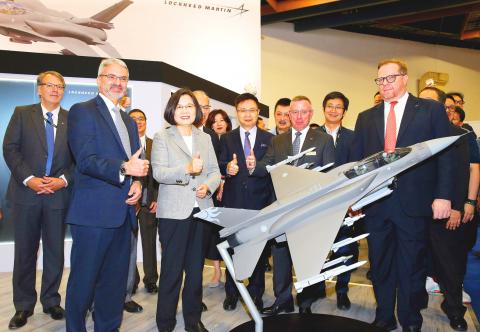President Tsai Ing-wen (蔡英文) yesterday made clear her intention to buy more upgraded F-16 jets from the US and expressed the hope that Washington would reach a decision on the sale, as she tried out an F-16 flight simulator at the opening of the Taipei Aerospace and Defense Technology Exhibition.
Tsai gave a speech at the opening ceremony at the Taipei World Trade Center’s Exhibition Hall 1 and toured the defense pavilion, where she viewed the indigenous Jian Hsiang anti-radiation drone, the Teng Yun medium-altitude long-endurance drone and experienced the F-16 simulator.
“I tried the F-16 simulator a while ago. We need to constantly enhance our air defense capability,” she said in an interview after the tour. “I hope we can have more F-16 jets.”

Photo: CNA
“I also hope that the US government can make a decision after they complete their internal process,” Tsai said.
The Ministry of National Defense made a request to the US in the first quarter of this year to purchase a fleet of advanced F-16V jets to increase Taiwan’s air defense capabilities amid increasing provocation from China.
However, progress appears to have stalled, as US President Donald Trump’s administration had yet to inform the US Congress of the proposed arms sale before it went into recess on July 26, five months after Taiwan made the request.
Some news reports said that this was due to the possible effect the deal would have on US-China relations amid an ongoing trade conflict.
In her speech, Tsai said that after she took office in May 2016, she incorporated the aerospace and defense industries into the “five plus two” innovative industries plan to use the government’s power to boost the private sector’s momentum.
Over the past three years, the government has proceeded with its goal of producing indigenous aircraft, she said, adding that advanced jet trainers in particular need to be domestically manufactured.
“The domestic aerospace industry reached NT$100 billion [US$3.18 billion at the current exchange rate] in 2016 and NT$120 billion last year,” she said.
Overseas firms have continued to place more orders, and the export value of the industry has grown 60 percent, she said, adding that these results show that the domestic aerospace industry is recognized internationally.
American Institute in Taiwan (AIT) Director Brent Christensen, also spoke at the opening, saying that Taiwan-US security cooperation goes beyond arms sales.
The US considers Taiwan a partner in realizing its vision of a “free and open Indo-Pacific,” the two nations’ militaries engage frequently and substantively in professional exchanges, and their authorities collaborate to enhance humanitarian assistance and disaster relief capabilities, he said.
“These investments by Taiwan are commendable, as is Taiwan’s ongoing commitment to increase the defense budget annually to ensure that Taiwan’s spending is sufficient to provide for its own self-defense needs,” Christensen said. “We anticipate that these figures will continue to grow commensurate with the threats Taiwan faces.”

INVESTIGATION: The case is the latest instance of a DPP figure being implicated in an espionage network accused of allegedly leaking information to Chinese intelligence Democratic Progressive Party (DPP) member Ho Jen-chieh (何仁傑) was detained and held incommunicado yesterday on suspicion of spying for China during his tenure as assistant to then-minister of foreign affairs Joseph Wu (吳釗燮). The Taipei District Prosecutors’ Office said Ho was implicated during its investigation into alleged spying activities by former Presidential Office consultant Wu Shang-yu (吳尚雨). Prosecutors said there is reason to believe Ho breached the National Security Act (國家安全法) by leaking classified Ministry of Foreign Affairs information to Chinese intelligence. Following interrogation, prosecutors petitioned the Taipei District Court to detain Ho, citing concerns over potential collusion or tampering of evidence. The

NEGOTIATIONS: Taiwan has good relations with Washington and the outlook for the negotiations looks promising, Minister of Economic Affairs J.W. Kuo said Taiwan’s GDP growth this year is expected to decrease by 0.43 to 1.61 percentage points due to the effects of US tariffs, National Development Council (NDC) Minister Paul Liu (劉鏡清) said at a meeting of the legislature’s Economics Committee in Taipei yesterday, citing a preliminary estimate by a private research institution. Taiwan’s economy would be significantly affected by the 32 percent “reciprocal” tariffs slapped by the US, which took effect yesterday, Liu said, adding that GDP growth could fall below 3 percent and potentially even dip below 2 percent to 1.53 percent this year. The council has commissioned another institution

TRADE: The premier pledged safeguards on ‘Made in Taiwan’ labeling, anti-dumping measures and stricter export controls to strengthen its position in trade talks Products labeled “made in Taiwan” must be genuinely made in Taiwan, Premier Cho Jung-tai (卓榮泰) said yesterday, vowing to enforce strict safeguards against “origin laundering” and initiate anti-dumping investigations to prevent China dumping its products in Taiwan. Cho made the remarks in a discussion session with representatives from industries in Kaohsiung. In response to the US government’s recent announcement of “reciprocal” tariffs on its trading partners, President William Lai (賴清德) and Cho last week began a series of consultations with industry leaders nationwide to gather feedback and address concerns. Taiwanese and US officials held a videoconference on Friday evening to discuss the

NEGOTIATIONS: The US response to the countermeasures and plans Taiwan presented has been positive, including boosting procurement and investment, the president said Taiwan is included in the first group for trade negotiations with the US, President William Lai (賴清德) said yesterday, as he seeks to shield Taiwanese exporters from a 32 percent tariff. In Washington, US Trade Representative Jamieson Greer said in an interview on Fox News on Thursday that he would speak to his Taiwanese and Israeli counterparts yesterday about tariffs after holding a long discussion with the Vietnamese earlier. US President Donald Trump on Wednesday postponed punishing levies on multiple trade partners, including Taiwan, for three months after trillions of US dollars were wiped off global markets. He has maintained a 10 percent